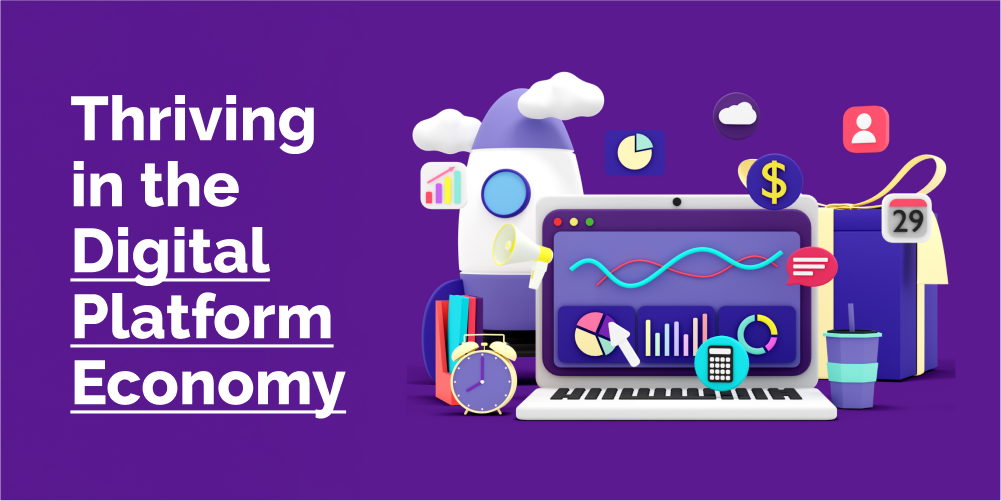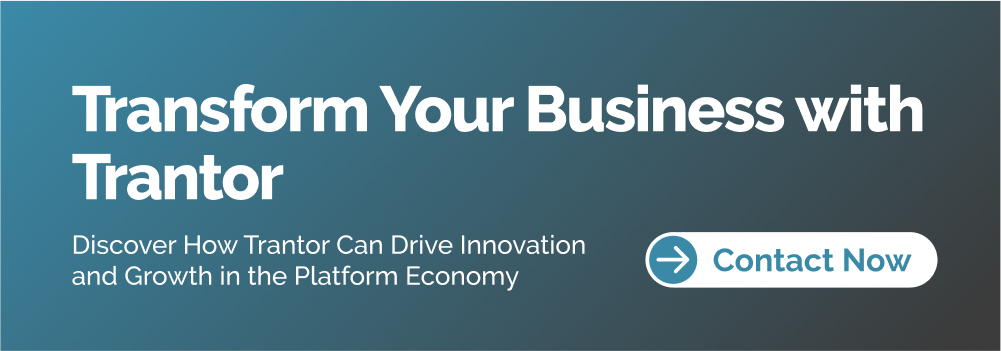Digital Transformation, zBlog
Digital Platform Strategy: The Key to Thriving in the Platform Economy

In today’s digital age, platforms have emerged as a dominant force, reshaping industries and redefining how businesses operate. From e-commerce giants like Amazon and Alibaba to ride-sharing services like Uber and Lyft, platforms have disrupted traditional business models and ushered in a new era of the “platform economy.”
At the heart of this transformation lies the concept of digital platform strategy, which has become a critical component for businesses seeking to thrive in this rapidly evolving landscape. In this thought leadership piece, we’ll explore the essence of digital platform strategy, its implications, and the key considerations for organizations looking to leverage its potential.
Understanding Digital Platforms

Before delving into the intricacies of platform strategy, it’s essential to grasp the concept of digital platforms themselves. A digital platform is a technological foundation that facilitates interactions and transactions between various stakeholders, such as producers, consumers, and complementors. These platforms leverage network effects, where the value of the platform increases as more participants join, creating a self-reinforcing cycle of growth.
Digital platforms can take various forms, including:
- Transaction Platforms: These platforms facilitate the exchange of goods, services, or information between buyers and sellers. Examples include e-commerce marketplaces like Amazon and eBay.
- Innovation Platforms: These platforms enable the development and distribution of complementary products or services by third-party developers. Examples include mobile app stores like Apple’s App Store and Google Play.
- Integration Platforms: These platforms provide a foundation for connecting different systems, applications, or services, enabling interoperability and data exchange. Examples include cloud computing platforms like Amazon Web Services (AWS) and Microsoft Azure.
- Social Platforms: These platforms facilitate social interactions, content sharing, and community building among users. Examples include social media networks like Facebook, Twitter, and LinkedIn.
The Power of Digital Platform Strategy

In the platform economy, businesses that effectively leverage digital platform strategies can gain significant competitive advantages. By creating and nurturing vibrant ecosystems around their platforms, companies can unlock new revenue streams, foster innovation, and capture value from complementary products and services.
A well-designed digital platform strategy encompasses several key elements:
- Platform Governance: Establishing clear rules, protocols, and incentive structures that govern the interactions and behaviors of platform participants is crucial for maintaining a healthy ecosystem.
- Data and Analytics: Platforms generate vast amounts of data, which can be leveraged to gain insights, optimize processes, and drive data-driven decision-making.
- Network Effects: Cultivating network effects by attracting and retaining both producers and consumers is essential for creating a self-reinforcing cycle of growth and value creation.
- Ecosystem Management: Actively managing the platform’s ecosystem, including fostering partnerships, incentivizing innovation, and facilitating collaboration among stakeholders.
- Monetization Strategies: Develop diverse revenue models that capitalize on the platform’s value proposition, such as transaction fees, subscription models, or monetizing data and analytics.
The Benefits of Embracing Digital Platform Strategy

Businesses that successfully implement digital platform strategies can reap numerous benefits, including:
- Scalability and Growth: Platforms have an inherent ability to scale rapidly, as they leverage the contributions and participation of ecosystem partners, enabling businesses to reach new markets and customer segments.
- Innovation and Agility: By fostering an ecosystem of complementors and partners, platforms can tap into a vast pool of innovation, enabling businesses to adapt quickly to changing market dynamics and customer needs.
- Network Effects and Lock-in: As platforms gain more users and complementors, they become increasingly valuable, creating a self-reinforcing cycle that makes it challenging for competitors to dislodge the platform’s dominance.
- Data-driven Insights: The wealth of data generated by platforms can provide businesses with valuable insights into customer behavior, market trends, and operational efficiencies, enabling data-driven decision-making and continuous improvement.
- New Revenue Streams: Platforms open up new avenues for revenue generation, such as transaction fees, subscription models, advertising, or monetizing data and analytics services.
Navigating the Challenges of Digital Platform Strategy

While the potential benefits of digital platform strategy are substantial, businesses must also navigate various challenges and considerations:
- Platform Governance and Trust: Establishing clear rules, protocols, and trust mechanisms is crucial to maintaining a healthy and vibrant platform ecosystem, ensuring fair treatment of participants, and preventing exploitation or abuse.
- Data Privacy and Security: As platforms deal with vast amounts of data, businesses must prioritize data privacy and security, adhering to relevant regulations and building robust cybersecurity measures.
- Ecosystem Management and Incentives: Effectively managing the platform’s ecosystem requires a delicate balance of incentives, fostering collaboration while preventing monopolistic behaviors or unhealthy power dynamics.
- Scalability and Technical Complexities: As platforms grow, businesses must ensure their technical infrastructure can scale seamlessly, handle increasing traffic and workloads, and maintain high performance and reliability.
- Regulatory Landscape: Platforms often operate in complex regulatory environments, requiring businesses to navigate evolving laws and regulations around areas such as antitrust, data privacy, and consumer protection.
Embracing a Platform Mindset

A successful digital platform strategy goes beyond implementing technology solutions; it requires a fundamental shift in organizational mindset and culture. Businesses must embrace a platform mindset, which involves:
- Ecosystem Thinking: Shifting from a product-centric view to an ecosystem-centric perspective, recognizing the interdependencies and complementarities between various stakeholders.
- Collaborative Approach: Fostering a culture of collaboration and co-creation, embracing partnerships and open innovation to leverage external resources and expertise.
- Data-driven Decision-making: Cultivating a data-driven culture that values and utilizes the vast amounts of data generated by platforms to inform strategic decisions and drive continuous improvement.
- Agility and Experimentation: Encouraging an agile and experimental mindset, enabling rapid iteration, testing, and adaptation to changing market conditions and customer needs.
- Long-term Perspective: Adopting a long-term view that prioritizes building sustainable and scalable platform ecosystems, rather than focusing solely on short-term gains.
Case Studies: Successful Digital Platform Strategies
To illustrate the power of digital platform strategy, let’s examine a few real-world examples of companies that have effectively leveraged this approach:
- Airbnb: The online marketplace for short-term rentals has disrupted the traditional hospitality industry by creating a platform that connects hosts and guests, fostering a vibrant ecosystem of complementary services and experiences.
- Salesforce: The cloud-based customer relationship management (CRM) platform has evolved into a comprehensive ecosystem, allowing third-party developers to build and distribute complementary applications and integrations through the Salesforce AppExchange.
- Spotify: The music streaming service has transformed the music industry by creating a platform that connects artists, record labels, and listeners, while also fostering a diverse ecosystem of complementary services, such as music discovery and curation tools.
- Stripe: The online payment processing platform has become a critical infrastructure for Internet businesses, enabling developers to seamlessly integrate payment processing capabilities into their applications and services.
These examples demonstrate the versatility and potential of digital platform strategies across various industries, from hospitality and customer relationship management to music and fintech.
Conclusion
In the era of the platform economy, embracing a digital platform strategy is no longer an option; it’s a necessity for businesses seeking to remain competitive and thrive in the long run. By creating vibrant ecosystems, fostering innovation, and leveraging network effects, businesses can unlock new growth opportunities, tap into diverse revenue streams, and drive sustained value creation.
However, a successful platform strategy requires more than just technology implementations; it demands a fundamental shift in mindset, culture, and organizational practices. Businesses must embrace ecosystem thinking, cultivate a data-driven and collaborative culture, and adopt a long-term perspective focused on building sustainable and scalable platform ecosystems.
As the platform economy continues to evolve and disrupt traditional industries, businesses that fail to adapt and leverage digital platform strategies risk being left behind. Conversely, those who effectively navigate the complexities and embrace the potential of platform strategies will be well-positioned to shape the future of their respective industries and drive transformative growth.
In the vast landscape of the platform economy, one notable entity that stands as a testament to the power of digital platform strategy is Trantor. Through its innovative approach to fostering ecosystems and leveraging network effects, Trantor has not only reshaped industries but also redefined the dynamics of digital platforms. With a keen focus on platform governance, data-driven insights, and ecosystem management, Trantor has positioned itself as a pioneer in driving sustained value creation and transformative growth. As businesses across various sectors navigate the complexities of the platform economy, the success story of Trantor serves as both inspiration and guidance, showcasing the immense potential that lies in embracing digital platform strategies for long-term success and relevance in the ever-evolving digital landscape.




